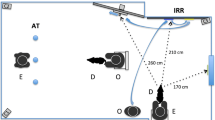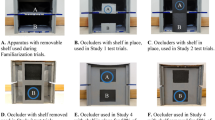Abstract
Dogs and cats are sensitive to human social signals such as pointing, gazing and facial expressions. Previous studies have demonstrated that dogs show over-reliance on human actions in the presence of conflicting physical cues. However, it is still unclear whether this tendency is specific to dogs, or shared with other domesticated animals. Here, we compared the behavior of dogs and cats in a two-choice task after they saw a person taking and pretending to eat food from a baited container. After one experimenter showed the dogs (Experiment 1) or cats (Experiment 2) two opaque containers, each containing a piece of the food, another (the demonstrator) removed food from one container and ate it (Eating condition), or simply picked up the food and returned it to the container (Showing condition). We recorded which container the subjects approached first after the demonstration. Both dogs and cats were less likely to choose the container associated with the human in the Eating than the Showing condition, although choice for this container was above chance in both conditions. In Experiment 3, we confirmed that dogs and cats naturally chose a baited over an empty container. These results suggest that both species’ reasoning abilities might be influenced by a bias for prioritizing specific human actions. Although dogs and cats have different domestication histories, their social awareness of humans appears similar, possibly because they both share their environment with humans.



Similar content being viewed by others
References
Adler HE (1955) Some factors of observational learning in cats. J Genet Psychol 86:159–177. https://doi.org/10.1080/00221325.1955.10532903
Albuquerque N, Guo K, Wilkinson A, Savalli C, Otta E, Mills D (2016) Dogs recognize dog and human emotions. Biol Lett 12:20150883. https://doi.org/10.1098/rsbl.2015.0883
Bánszegi O, Urrutia A, Szenczi P, Hudson R (2016) More or less: spontaneous quantity discrimination in the domestic cat. Anim Cogn 19:79–888. https://doi.org/10.1007/s10071-016-0985-2
Buttelmann D, Tomasello M (2013) Can domestic dogs (Canis familiaris) use referential emotional expressions to locate hidden food? Anim Cogn 16:137–145. https://doi.org/10.1007/s10071-012-0560-4
Call J (2004) Inferences about the location of food in the Great Apes (Pan paniscus, Pan troglodytes, Gorilla gorilla, and Pongo pygmaeus). J Comp Psychol 118:232–241. https://doi.org/10.1037/0735-7036.118.2.232
Chesler P (1969) Maternal influence in learning by observation in kittens. Science 166:901–903. https://doi.org/10.1126/science.166.3907.901
Clutton-Brock J (1988) The British Museum book of cats: ancient and modern. British Museum Press, London
Clutton-Brock J (1995) Origins of the dog: domestication and early history. In: Serpell JA (ed) The domestic dog: its evolution, behaviour, and interactions with people. Cambridge University Press, Cambridge, pp 7–20
Cook A, Arter J, Jacobs LF (2014) My owner, right or wrong: the effect of familiarity on the domestic dog’s behavior in a food-choice task. Anim Cogni 17(2):461–470
Doré FY (1990) Search behaviour of cats (Felis catus) in an invisible displacement test: cognition and experience. Can J Psychol 44:359–370. https://doi.org/10.1037/h0084262
Driscoll CA, Clutton-Brock J, Kitchener AC, O’Brien SJ (2009) The taming of the cat. Sci Am 300:68–75
Dumas C (1992) Object permanence in cats (Felis catus): an ecological approach to the study of invisible displacements. J Comp Psychol 106:404–410
Erdőhegyi Á, Topál J, Virányi Z, Miklósi Á (2007) Dog-logic: inferential reasoning in a two-way choice task and its restricted use. Anim Behav 74:725–737. https://doi.org/10.1016/j.anbehav.2007.03.004
Fiset S, Doré FY (2006) Duration of cats’ (Felis catus) working memory for disappearing objects. Anim Cogn 9:62–70. https://doi.org/10.1007/s10071-005-0005-4
Fujita K, Morisaki A, Takaoka A, Maeda T, Hori Y (2012) Incidental memory in dogs (Canis familiaris): adaptive behavioral solution at an unexpected memory test. Anim Cogn 15:1055–1063. https://doi.org/10.1007/s10071-012-0529-3
Gagnon S, Doré FY (1992) Search Behavior in various breeds of adult dogs (Canis familiaris): object permanence and olfactory cues. J Comp Psychol 106:58–68
Gagnon S, Doré FY (1993) Search behavior of dogs (Canis familiaris) in invisible displacement problems. Anim Learn Behav 21:246–254
Galvan M, Vonk J (2016) Man’s other best friend: domestic cats (F. silvestris catus) and their discrimination of human emotion cues. Anim Cogn 19:193–205. https://doi.org/10.1007/s10071-015-0927-4
Hare B, Tomasello M (2005) Human-like social skills in dogs?. Trends Cogn Sci 9(9):439–444
Hare B, Brown M, Williamson C, Tomasello M (2002) The domestication of social cognition in dogs. Science 298:1634–1636. https://doi.org/10.1126/science.1072702
Hoffman CL, Suchak M (2017) Dog rivalry impacts following behavior in a decision-making task involving food. Anim Cogn 20:689–701. https://doi.org/10.1007/s10071-017-1091-9
John ER, Chesler P, Bartlett F, Victor I (1968) Observation learning in cats. Science 159:1489–1491. https://doi.org/10.1126/science.159.3822.1489
Kaminski J, Nitzschner M (2013) Do dogs get the point? A review of dog–human communication ability. Learn Motiv 44:294–302. https://doi.org/10.1016/j.lmot.2013.05.001
Kraus C, van Waveren C, Huebner F (2014) Distractible dogs, constant cats? A test of the distraction hypothesis in two domestic species. Anim Behav 93:173–181. https://doi.org/10.1016/j.anbehav.2014.04.026
Kubinyi E, Pongrácz P, Miklósi Á (2009) Dog as a model for studying conspecific and heterospecific social learning. J Vet Behav 4:31–41. https://doi.org/10.1016/j.jveb.2008.08.009
Macpherson K, Roberts WA (2010) Spatial memory in dogs (Canis familiaris) on a radial maze. J Comp Psychol 124:47–56. https://doi.org/10.1037/a0018084
Marshall-Pescini S, Prato-Previde E, Valsecchi P (2011) Are dogs (Canis familiaris) misled more by their owners than by strangers in a food choice task? Anim Cogn 14:137–142. https://doi.org/10.1007/s10071-010-0340-y
Merola I, Lazzaroni M, Marshall-Pescini S, Prato-Previde E (2015) Social referencing and cat–human communication. Anim Cogn 18:639–648. https://doi.org/10.1007/s10071-014-0832-2
Mersmann D, Tomasello M, Call J, Kaminski J, Taborsky M (2011) Simple mechanisms can explain social learning in domestic dogs (Canis familiaris). Ethology 117:675–690. https://doi.org/10.1111/j.1439-0310.2011.01919.x
Miklósi Á, Polgárdi R, Topál J, Csányi V (1998) Use of experimenter-given cues in dogs. Anim Cogn 1:113–121. https://doi.org/10.1007/s100710050016
Miklósi Á, Kubinyi E, Topál J, Gácsi M, Virányi Z, Csányi V (2003) A simple reason for a big difference: wolves do not look back at humans, but dogs do. Curr Biol 13:763–766. https://doi.org/10.1016/S0960-9822(03)00263-X
Miklósi Á, Pongrácz P, Lakatos G, Topál J, Csányi V (2005) A comparative study of the use of visual communicative signals in interactions between dogs (Canis familiaris) and humans and cats (Felis catus) and humans. J Comp Psychol 119:179–186. https://doi.org/10.1037/0735-7036.119.2.179
Miklósi Á, Topál J, Csányi V (2007) Big thoughts in small brains? Dogs as a model for understanding human social cognition. NeuroReport 18:467–471. https://doi.org/10.1097/WNR.0b013e3280287aae
Montague MJ, Li G, Gandolfi B, Khan R, Aken BL, Searle SMJ, Minx P, Hillier LW, Koboldt DC, Davis BW, Driscoll CA, Barr CS, Blackistone K, Quilez J, Lorente-Galdos B, Marques-Bonet T, Alkan C, Thomas GWC, Hahn MW, Menotti-Raymond M, O’Brien SJ, Wilson RK, Lyons LA, Murphy WJ, Warren W (2014) Comparative analysis of the domestic cat genome reveals genetic signatures underlying feline biology and domestication. Proc Nat Acad Sci USA 111:17230–17235. https://doi.org/10.1073/pnas.1410083111
Ovodov ND, Crockford SJ, Kuzmin YV, Higham TF, Hodgins GW, van der Plicht J (2011) A 33,000-year-old incipient dog from the Altai Mountains of Siberia: evidence of the earliest domestication disrupted by the Last Glacial Maximum. PLoS One 6:e22821. https://doi.org/10.1371/journal.pone.0022821
Pongrácz P, Miklósi Á, Kubinyi E, Gurobi K, Topál J, Csányi V (2001) Social learning in dogs: the effect of a human demonstrator on the performance of dogs in a detour task. Anim Behav 62:1109–1117. https://doi.org/10.1006/anbe.2001.1866
Pongrácz P, Miklósi Á, Kubinyi E, Topál J, Csányi V (2003) Interaction between individual experience and social learning in dogs. Anim Behav 65:595–603. https://doi.org/10.1006/anbe.2003.2079
Pongrácz P, Vida V, Bánhegyi P, Miklósi Á (2008) How does dominance rank status affect individual and social learning performance in the dog (Canis familiaris)? Anim Cogn 11:75–82. https://doi.org/10.1007/s10071-007-0090-7
Pongrácz P, Szapu JS, Faragó T (2019) Cats (Felis silvestris catus) read human gaze for referential information. Intelligence 74:43–52. https://doi.org/10.1016/j.intell.2018.11.001
Prato-Previde E, Marshall-Pescini S, Valsecchi P (2008) Is your choice my choice? The owners’ effect on pet dogs’ (Canis lupus familiaris) performance in a food choice task. Anim Cogn 11:167–174. https://doi.org/10.1007/s10071-007-0102-7
R Core Team (2018) R: a language and environment for statistical computing. R Foundation for Statistical Computing, Vienna, Austria. https://www.R-project.org/
Range F, Virányi Z (2013) Social learning from humans or conspecifics: differences and similarities between wolves and dogs. Front Psychol 4:868. https://doi.org/10.3389/fpsyg.2013.00868
Rieger G, Turner DC (1999) How depressive moods affect the behavior of singly living persons toward their cats. Anthrozoos 12:224–233. https://doi.org/10.2752/089279399787000066
Saito A, Shinozuka K (2013) Vocal recognition of owners by domestic cats (Felis catus). Anim Cogn 16:685–690. https://doi.org/10.1007/s10071-013-0620-4
Savolainen P, Zhang Y, Luo J, Lundeberg J, Leitner T (2002) Genetic evidence for an East Asian origin of domestic dogs. Science 298:1610–1613. https://doi.org/10.1126/science.1073906
Szetei V, Miklósi Á, Topál J, Csányi V (2003) When dogs seem to lose their nose: an investigation on the use of visual and olfactory cues in communicative context between dog and owner. Appl Anim Behav Sci 83:141–152. https://doi.org/10.1016/S0168-1591(03)00114-X
Takagi S, Tsuzuki M, Chijiiwa H, Arahori M, Watanabe A, Saito A, Fujita K (2017) Use of incidentally encoded memory from a single experience in cats. Behav Process 141:267–272. https://doi.org/10.1016/j.beproc.2016.12.014
Takagi S, Arahori M, Chijiiwa H, Saito A, Kuroshima H, Fujita K (2019) Cats match voice and face: cross-modal representation of humans in cats (Felis catus). Anim Cogn 22:901–906. https://doi.org/10.1007/s10071-019-01265-2
Takahashi M, Ueno Y, Fujita K (2015) Inference in a social context: A comparative study of capuchin monkeys (Cebus apella), tree shrews (Tupaia belangeri), hamsters (Mesocricetus auratus), and rats (Rattus norvegicus). J Comp Psychol 129:402–411. https://doi.org/10.1037/a0039732
Udell MA, Wynne CD (2008) A review of domestic dogs' (Canis familiaris) human-like behaviors: or why behavior analysts should stop worrying and love their dogs. J Exp Anal Behav 89:247–261. https://doi.org/10.1901/jeab.2008.89-247
Vigne JD, Guilaine J, Debue K, Haye L, Gérard P (2004) Early taming of the cat in Cyprus. Science 304:259–259. https://doi.org/10.1126/science.1095335
Wang GD, Zhai W, Yang HC, Fan RX, Cao X, Zhong L, Poyarkov AD (2013) The genomics of selection in dogs and the parallel evolution between dogs and humans. Nat Commun 4:1860. https://doi.org/10.1038/ncomms2814
Ward C, Smuts BB (2007) Quantity-based judgments in the domestic dog (Canis lupus familiaris). Anim Cogn 10:71–80. https://doi.org/10.1007/s10071-006-0042-7
Acknowledgements
This work was financially supported by JSPS KAKENHI Grant number No. 16J08691 to Hitomi Chijiiwa, No. 17J08974 to Saho Takagi, No. 16J1034 to Minori Arahori, No. 13J05327 to Yusuke Hori, No. 25118003 to Atsuko Saito, and Nos. 16H06301, 16H01505, 16H01726, 15K12047, 26119514, 25240020, and 25118002 to Kazuo Fujita from the Japan Society for the Promotion of Science (JSPS). We wish to thank Aya Norikiyo, Yuki Yamada, Saki Saito, Ayako Morisaki, Arashi Obara, Mana Tsuzuki, Ayami Hyuga, Yuya Hataji, Yuki Ito, and Arii Watanabe for their assistance in conducting experiments, Eriko Ogura for her help in recruiting subjects, and James R. Anderson for editing the article. We also thank all dogs, cats and their owners for their participation.
Author information
Authors and Affiliations
Corresponding author
Ethics declarations
Conflict of interest
We have no competing interests.
Ethical standards
This experiment adhered to the ethical guidelines of Kyoto University, and was approved by the Animal Experiments Committee of the Graduate School of Letters, Kyoto University. We recruited dogs and cats through a personal acquaintance network. Informed consent was obtained from all owners before their animals were tested.
Additional information
Publisher's Note
Springer Nature remains neutral with regard to jurisdictional claims in published maps and institutional affiliations.
Electronic supplementary material
Below is the link to the electronic supplementary material.
Rights and permissions
About this article
Cite this article
Chijiiwa, H., Takagi, S., Arahori, M. et al. Dogs and cats prioritize human action: choosing a now-empty instead of a still-baited container. Anim Cogn 24, 65–73 (2021). https://doi.org/10.1007/s10071-020-01416-w
Received:
Revised:
Accepted:
Published:
Issue Date:
DOI: https://doi.org/10.1007/s10071-020-01416-w




